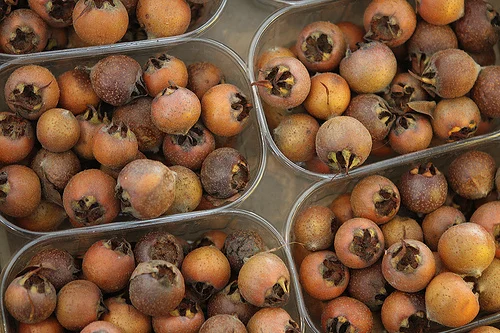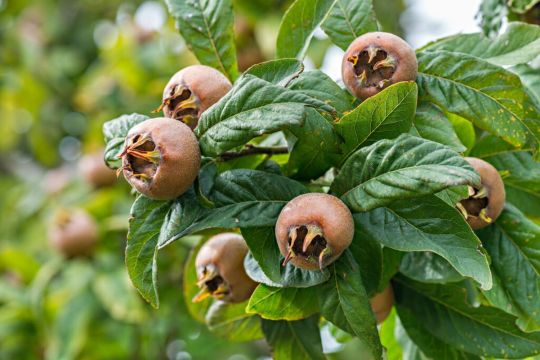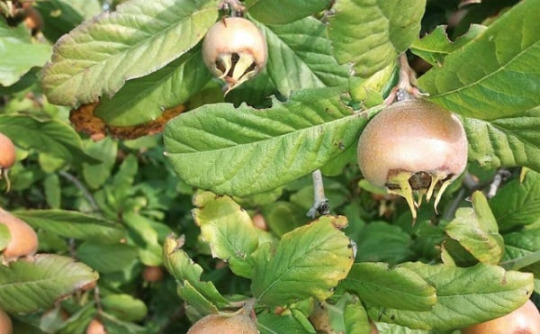#Mespilus germanica
Explore tagged Tumblr posts
Video
n158_w1150 by Biodiversity Heritage Library Via Flickr: Le Règne végétal; Paris,L. Guérin,1870-72. biodiversitylibrary.org/page/12021934
#Bio-bibliography#Botany#Pictorial works#Plants#New York Botanical Garden#LuEsther T. Mertz Library#bhl:page=12021934#dc:identifier=https://biodiversitylibrary.org/page/12021934#flickr#botanical illustration#scientific illustration#purple fig#white fig#fig#quince#portugal quince#ficus carica#nefle#nefle fruit#Mespilus germanica#medlar#Cydonia vulgaris#Pyrus cydonin#fruit#fruits
1 note
·
View note
Video
Mispel - potloodtekening / Medlar - pencil drawing by Janneke Booister Via Flickr: Pencils on 'I Love Art' Mixed Media paper 250 g/m2.
Colours used are Copper Beech, Sepia, Primrose Yellow, Deep Cadmium, Scarlet Lake, Deep Vermillion; all Derwent Watercolour pencils.
My own reference.
Paper size 21 x 30 cm (A4), available (Contact me)
Het verhaal van deze tekening is te vinden in mijn blog / The story of this drawing can be found in my blog jannekesatelier.blogspot.com/
#Tekening#Janneke Booister#plant#Mespilus germanica#herfst#aquarelpotloden#atmosfeer#Drawing#autumn#watercolour pencils#atmosphere#flickr
0 notes
Text
Some Uncommon Fruits & Vegetables
to include in your next poem/story
Black sapote - a Mexican persimmon (Diospyros ebenaster) with an almost seedless dark-fleshed fruit.
Buddha's hand - a citron (Citrus medica var. sarcodactylis) that is cultivated in eastern Asia as an ornamental and for its very fragrant fruit which is split into several usually pulpless sections.
Cherimoya - a round, oblong, or heart-shaped fruit with a pitted pale green rind that is borne by a widely cultivated tropical American tree (Annona cherimola) of the custard-apple family.
Loquat - the small yellow edible fruit of an Asian evergreen tree (Eriobotrya japonica) of the rose family.
Medlar - the crab apple-like fruit of a small deciduous Eurasian tree (Mespilus germanica) of the rose family.
Oca - the cultivated tuber of either of two South American wood sorrels (Oxalis crenata and O. tuberosa).
Pawpaw - the edible green-skinned fruit of a purple-flowered North American tree (Asimina triloba) of the custard-apple family.
Salsify - the long fusiform edible root of a European biennial composite herb (Tragopogon porrifolius).
Skirret - the sweet edible tuberous root of an Asian herb (Sium sisarum).
Sunchoke - or Jerusalem artichoke; a perennial sunflower (Helianthus tuberosus) of the U.S. and Canada widely cultivated for its tubers that are used as a vegetable and as a livestock feed.
If any of these words make it into your next poem/story, please tag me. Or send me a link. I'd love to read them!
More: Word Lists
#writing prompt#creative writing#words#writeblr#writers on tumblr#poets on tumblr#poetry#literature#lit#spilled ink#food#fruits#vegetables#langblr#studyblr#word list
67 notes
·
View notes
Text


What's this? Fruit from medlar bushes (Mespilus germanica). How do they taste? Sort of like cinnamon-y applesauce.
26 notes
·
View notes
Text
this year i hope i can get seeds from amelanchier, fragula, malus sylvestris, mespilus germanica, pyrus communis L., rubus idaeus, sorbus aria, sorbus domestica, sorbus torminalis, rubia, celtis australis, smilax aspera, pistacia lentiscus...
4 notes
·
View notes
Text
#Medlar????#do not even know what that is but alrighty
it's a fruit innit
"In the southwest of England it historically had a number of vulgar nicknames, such as open-arse and monkey's bottom, due to the appearance of its large calyx."
look at the republican calendar and see which animal/plant/item is associated with your birthday ok. if you're born january 14 you get the day of the cat
35K notes
·
View notes
Text
Bletted medlar pulp to be added to the cider. Organic grown at Beau Vista orchards. Medlar or Mespilus germanica, is a small pome fruit bearing tree in the large rose family Rosaceae to which apples pears quince hawthorn also belong. #cider #medlar

0 notes
Text
Ο παράξενος καρπός του χειμώνα – Καλλιεργήθηκε από τους αρχαίους Έλληνες και το χρησιμοποιούσαν ως φάρμακο
H μουσμουλιά, όπως την αποκαλούμε στα μέρη μου, ή καλύτερα η χειμωνιάτικη μουσμουλιά, μιας και διαφέρει από τη μουσμουλιά που γνωρίζουν οι περισσότεροι. Για να είμαστε πιο ακριβής και για να καταλάβετε περί τίνος πρόκειται, η πρώτη στην οποία αναφερόμαστε ανήκει στο είδος Mespilus germanica, την αποκαλούν και ως μουσμουλιά των βουνών και είναι παλιά […] Ο παράξενος καρπός του χειμώνα –…
View On WordPress
0 notes
Text
Ο παράξενος καρπός του χειμώνα – Καλλιεργήθηκε από τους αρχαίους Έλληνες και το χρησιμοποιούσαν ως φάρμακο
H μουσμουλιά, όπως την αποκαλούμε στα μέρη μου, ή καλύτερα η χειμωνιάτικη μουσμουλιά, μιας και διαφέρει από τη μουσμουλιά που γνωρίζουν οι περισσότεροι. Για να είμαστε πιο ακριβής και για να καταλάβετε περί τίνος πρόκειται, η πρώτη στην οποία αναφερόμαστε ανήκει στο είδος Mespilus germanica, την αποκαλούν και ως μουσμουλιά των βουνών και είναι παλιά […] Ο παράξενος καρπός του χειμώνα –…
View On WordPress
0 notes
Text
Ο παράξενος καρπός του χειμώνα – Καλλιεργήθηκε από τους αρχαίους Έλληνες και το χρησιμοποιούσαν ως φάρμακο
H μουσμουλιά, όπως την αποκαλούμε στα μέρη μου, ή καλύτερα η χειμωνιάτικη μουσμουλιά, μιας και διαφέρει από τη μουσμουλιά που γνωρίζουν οι περισσότεροι. Για να είμαστε πιο ακριβής και για να καταλάβετε περί τίνος πρόκειται, η πρώτη στην οποία αναφερόμαστε ανήκει στο είδος Mespilus germanica, την αποκαλούν και ως μουσμουλιά των βουνών και είναι παλιά […] Ο παράξενος καρπός του χειμώνα –…
View On WordPress
0 notes
Text
Ο παράξενος καρπός του χειμώνα – Καλλιεργήθηκε από τους αρχαίους Έλληνες και το χρησιμοποιούσαν ως φάρμακο
H μουσμουλιά, όπως την αποκαλούμε στα μέρη μου, ή καλύτερα η χειμωνιάτικη μουσμουλιά, μιας και διαφέρει από τη μουσμουλιά που γνωρίζουν οι περισσότεροι. Για να είμαστε πιο ακριβής και για να καταλάβετε περί τίνος πρόκειται, η πρώτη στην οποία αναφερόμαστε ανήκει στο είδος Mespilus germanica, την αποκαλούν και ως μουσμουλιά των βουνών και είναι παλιά […] Ο παράξενος καρπός του χειμώνα –…
View On WordPress
0 notes
Text
Revealing the health miracle of medlar: a fruit with hidden treasures
In the world of exotic fruits, medlars (Mespilus germanica) often take a backseat compared to more impressive fruits. But this humble fruit, with its unique flavor and countless health benefits, is worth a closer look. In this blog post, we explore Medlar's rich nutritional profile with Farzana Fruits & vegetables Importer in UAE and see how incorporating Medlar into your diet can contribute to your overall health.
Nutritional profile:
Rich in dietary fiber:
Medlar is an excellent source of fiber that supports digestive health and promotes satiety. Fiber content improves intestinal function and prevents constipation.
Vitamins and minerals:
This unremarkable fruit is rich in essential vitamins such as vitamin C, vitamin K, and various B vitamins. In addition, medlar contains minerals such as potassium, iron, and manganese, all of which are important for maintaining various functions of the body.
Antioxidant properties:
Medlar is rich in antioxidants such as polyphenols and flavonoids, which play an important role in neutralizing free radicals in the body. Antioxidants protect cells from oxidative stress and reduce the risk of chronic diseases.
Health benefits:
Heart health:
The fiber, potassium, and antioxidants found in medlar contribute to heart health. Fiber helps control cholesterol levels, potassium regulates blood pressure, and antioxidants protect the cardiovascular system.
Strengthening the immune system:
Medlar, with its amazing vitamin C content, supports the immune system by increasing white blood cell production and promoting overall immune function. This is especially beneficial during cold and flu season.
Digestive health:
Medlar's high fiber content prevents constipation and promotes a healthy digestive system by supporting regular bowel movements. It also helps maintain a healthy gut flora.
Anti-inflammatory effect:
Medlar's antioxidants contribute to its anti-inflammatory properties and may reduce inflammation in the body. Chronic inflammation is associated with a variety of health problems, making medlar a valuable addition to an anti-inflammatory diet.
Incorporate medlar into your diet:
Fresh consumption:
You can enjoy the freshness of Medlar by washing it well and eating it whole. The taste is a delicious combination of sweet and sour.
Jam and jam:
Medlar's unique flavor makes it perfect for making jams, jellies, and preserves. You can spread it on toast or use it as a topping for yogurt.
Baking and cooking:
Add Medlar to your favorite baked goods such as muffins, cakes, and pies. Fruits add unique flavor and nutritional value to recipes.
In summary, medlar may be an overlooked fruit, but its nutritional richness and health benefits make it a worthy addition to a balanced diet. Whether enjoyed fresh or incorporated into a variety of dishes, medlars may improve your overall health. So the next time you spot this obscure fruit, think about the hidden treasures it can bring to your health.
#Fruits Wholesale Distributor UAE#Vegetables Wholesale Distributor UAE#Food Items Wholesale Distributor UAE#Fruits & vegetables Importer in UAE#Fruits & vegetables Exporter in UAE#re-export fruits & vegetables from uae#vegetables wholesale in the uae#fruits & vegetable food service supplier#fresh fruits suppliers dubai#fruits & vegetables supplier in the uae#fruits wholesaler in the uae#fruits & veggies distributor in dubai#fruit company in dubai
0 notes
Text
Britain’s Forgotten Fruit
The #medlar - Britain's forgotten #fruit #gardening
Nothing if not versatile, the fruit of the medlar (Mespilus germanica)could be skinned and served individually with cream, baked with apple, stewed with butter, or roasted over an open fire. It was an ideal ingredient for cakes and tarts and was often made into jams, marmalades, and jellies. Medlar jelly is still available commercially, rich red in colour “rather like dark sherry” and tasting…

View On WordPress
#Complete Herbal#Gardeners’ Chronicle#Medlar#Mespilus germanica#Nicholas Culpeper#Richard de Ware#Silchester#Westminster Abbey Customary
0 notes
Text

H μουσμουλιά, όπως την αποκαλούμε στα μέρη μου, ή καλύτερα η χειμωνιάτικη μουσμουλιά, μιας και διαφέρει από τη μουσμουλιά που γνωρίζουν οι περισσότεροι. Για να είμαστε πιο ακριβής και για να καταλάβετε περί τίνος πρόκειται, η πρώτη στην οποία αναφερόμαστε ανήκει στο είδος Mespilus germanica, την αποκαλούν και ως μουσμουλιά των βουνών και είναι παλιά ποικιλία, που βρίσκεται στη χώρα... Περισσότερα εδώ: https://romios.gr/o-paraxenos-karpos-toy-cheimona-kalliergithike-apo-toys-archaioys-ellines-kai-to-chrisimopoioysan-os-farmako/
#Ορθοδοξία#ΥΓΕΙΑΔΙΑΤΡΟΦΗ#από#αρχαίους#Έλληνες#και#Καλλιεργήθηκε#καρπός#παράξενος#Το#του#τους#φάρμακο#χειμώνα#χρησιμοποιούσαν#ως
0 notes
Text
learned of a new fruit today: the medlar (Mespilus germanica).

unsurprisingly in the family Rosaceae, because what isn't? but not only is this a completely unfamiliar fruit to me, it also undergoes a process i've never heard of: bletting.

this is actually crazy, why is no one talking about bletting?? seems like it used to be a well-known process in like shakespeare's time but it's just not really a thing when it comes to fruit consumption in the modern u.s.
0 notes
Text
Liste d'arbres nourricier pour l'homme, de climat tempéré
Châtaigner Castanea sativa
Mûrier blanc Morus alba
Mûrier noir Morus nigra
Figuier Ficus carica
Noisetier (Coudrier) Corylus avellana (5-7m)
Noisetier de Byzance Corylus colurna (25m)
Noyer commun Juglans regia
Tilleul à petites feuilles Tilia cordata
Pin pignon Pinus pinea
Asiminier trilobé Asimina triloba
Cormier (shnaps) Sorbus domestica
Amandier Prunus communis
Prunier Prunus domestica
Mirabellier Prunus domestica subsp. syriaca
Merisier Prunus avium
Cerisier acide (griottier) Prunus cerasus
Pêcher Prunus persica
Abricotier Prunus armeniaca
Poirier commun Pyrus communis
Poirier Pyrus pyraster (aiguillons sur les rameaux)
Poirier d'ornement Pyrus salicifolia (feuillage argenté de saule)
Cognassier Cydonia oblonga
Pommier sauvage Malus sylvestris
Amélanchier du Canada Amelanchier canadensis
Sureau
Arbustes nourriciers pour l'homme, de climat tempéré
Néflier (5-6m) Mespilus germanica
Épine noire (prunellier) Prunus spinosa
Murier sans épines Rubus fruticosus
Framboisier Rubus idaeus
Cassissier Ribes nigrum
Groseiller Ribes rubrum
Arbousier Arbutus unedo
Myrtillier Vaccinium myrtillus
Canneberge Vaccinium macrocarpon
Poivrier du sichuan Zanthoxylum piperitum
Chalef Eleagnus multiflora
Argousier Hippophae rhamnoides
Nashi Pyrus pyrifolia
Camérisier Lonicera caerulea
Aronia Aronia melanocarpa
Arbre aux faisans Leycesteria formosa
Goji (invasif) Lycium barbarum
0 notes